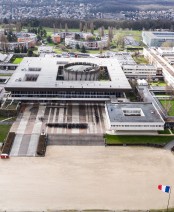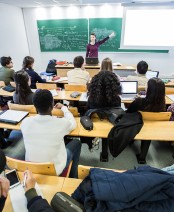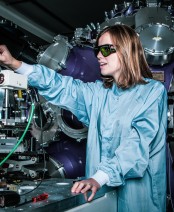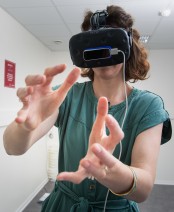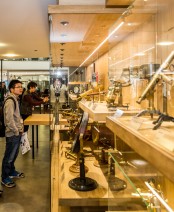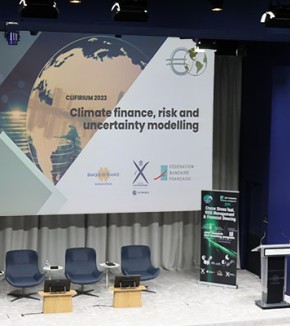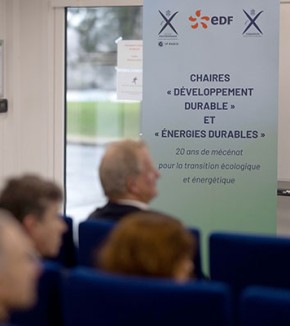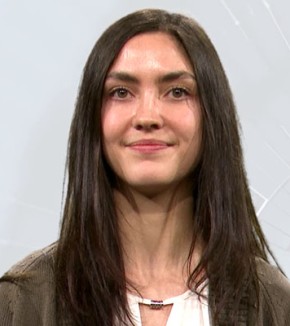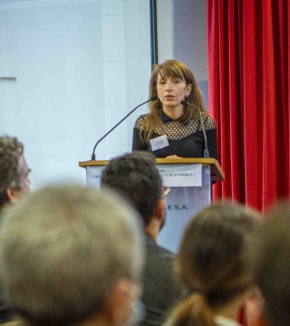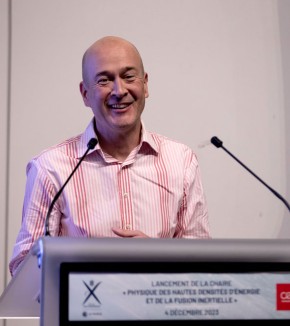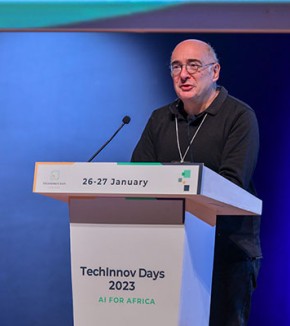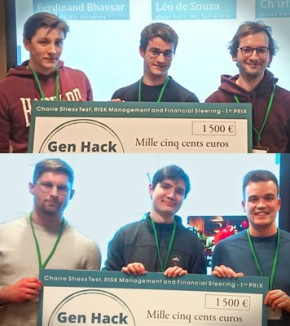In Morocco, the Chair "Data Science and Industrial Processes" co-organises the "Winter School - Generative AI"
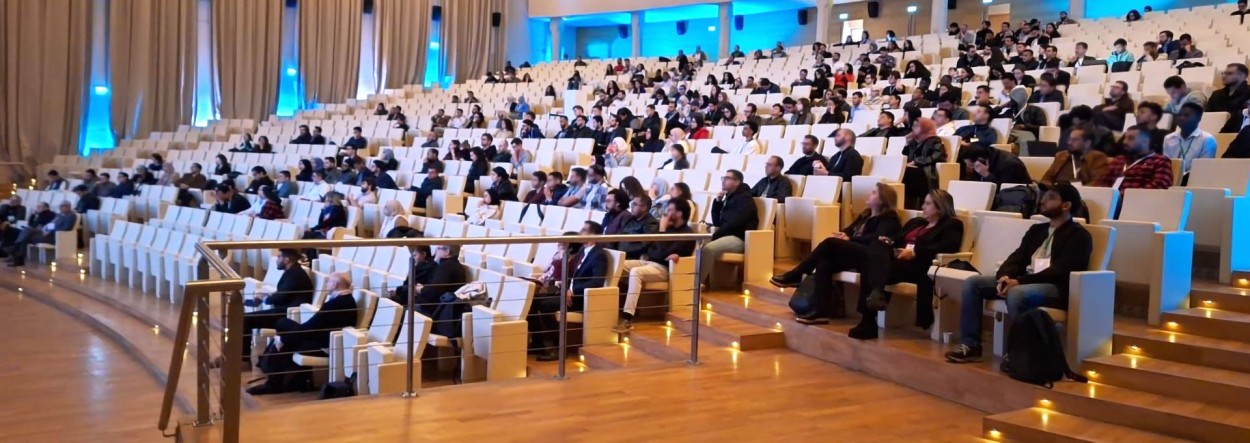 The "Winter School - Generative AI" opened on the EMINES campus in Ben Guérir (Morocco). / Photo : Mehdi Abou El Qassime
The "Winter School - Generative AI" opened on the EMINES campus in Ben Guérir (Morocco). / Photo : Mehdi Abou El Qassime
With more than 440 people attending over 5 days, the event was a success. Held in Casablanca and Ben Guérir, Morocco, the "Winter School - Generative AI" brought together specialists in generative artificial intelligence from 12 countries on 4 continents. The event was organised by École Centrale Casablanca, École Polytechnique through its Chair “Data Science and Industrial Processes”, and the School of Industrial Management (EMINES) at Université Mohammed VI Polytechnic (UM6P), which is also an academic partner of the Chair." brought together specialists in generative artificial intelligence from 12 countries on 4 continents. The event was organised by École Centrale Casablanca, École Polytechnique through its Chair “Data Science and Industrial Processes”, and the School of Industrial Management (EMINES) at Université Mohammed VI Polytechnic (UM6P), which is also an academic partner of the Chair. The event's organising committee was chaired by Mohammed El Rhabi, professor at the École Centrale Casablanca and head of its applied mathematics, computer science and data science unit.
Like the TechInnov Days - AI for Africa, organised in 2023 by the same institutions, the event combined scientific conferences, poster sessions and round tables. A new feature: the "Winter School - Generative AI" included two days dedicated to a student challenge bringing together artificial intelligence students from UM6P and Centrale Casablanca. This hackathon featured 9 projects based on generative AI, proposed by major AI players [including Meta, Hugging Face, Norma, Chainlit, Sense4data]. Eric Moulines, researcher at the Centre for Applied Mathematics (CMAP*) and head of the Chair, sat on the jury.
Like the TechInnov Days - AI for Africa, organised in 2023 by the same institutions, the event combined scientific conferences, poster sessions and round tables. A new feature: the "Winter School - Generative AI" included two days dedicated to a student challenge bringing together artificial intelligence students from UM6P and Centrale Casablanca. This hackathon featured 9 projects based on generative AI, proposed by major AI players [including Meta, Hugging Face, Norma, Chainlit, Sense4data]. Eric Moulines, researcher at the Centre for Applied Mathematics (CMAP*) and head of the Chair, sat on the jury.
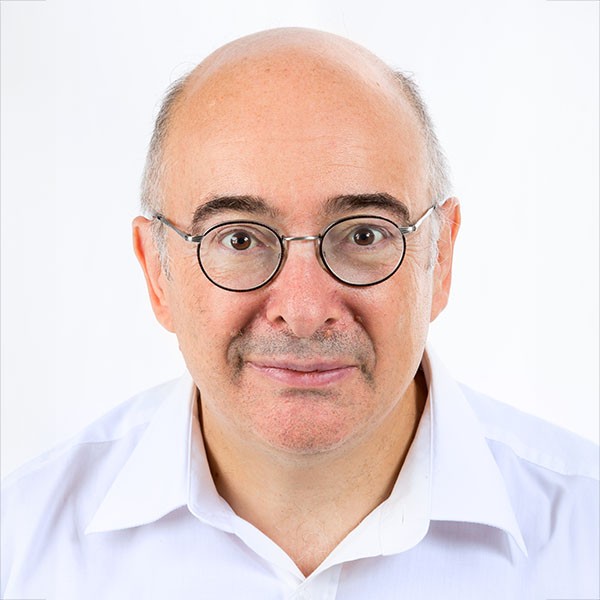
"In 2024, generative artificial intelligence is at the heart of the digital revolution, radically transforming the creative industries, research and development, and our everyday interaction with technology. It can generate innovative content, such as text, images, music and even code, in a way that mimics human creativity, but at an unprecedented scale and speed. This ability to create personalised, interactive content opens up new avenues in education, entertainment, product design and communication.
The very short-term outlook is promising, with expected advances in the accuracy, diversity and accessibility of generative AI tools. The continuous improvement of algorithms promises a better understanding and generation of linguistic and cultural nuances, making these technologies more inclusive. In addition, the integration of generative AI into collaborative working platforms augurs an increase in productivity and creativity, offering professionals powerful tools to innovate and solve complex problems quickly. Finally, the democratisation of access to these technologies will stimulate innovation at all levels, from start-ups to major corporations, via education and academic research."
The event featured talks by leading figures in the field of artificial intelligence, including Joëlle Barral (Google DeepMind), Yann LeCun (Courant Institute NY and Meta), and Eric Xing (MBZUAI and Carnegie Mellon University).
Michalis Vazirgiannis, a researcher at the École Polytechnique Computer Science Laboratory (LIX**) and professor at the École Polytechnique, gave an introduction to large language models (LLMs), a type of statistical learning model based on very large volumes of data. Then, in a talk focusing more specifically on generative AI, he presented current research directions for multimodal generative models involving graphs and applications to the generation of texts on protein functions - the prot2text model.
The Institut Polytechnique de Paris was also represented, with the participation of Gaël Richard, professor at Télécom Paris and scientific co-director of the Hi! PARIS centre.
The 'Winter School - Generative AI' succeeded in bringing together players from the academic and industrial worlds, as evidenced by the 53 universities and 37 companies represented in the audience, those numbers highlight the great interest now being shown in research into generative models and their applications.
The event featured talks by leading figures in the field of artificial intelligence, including Joëlle Barral (Google DeepMind), Yann LeCun (Courant Institute NY and Meta), and Eric Xing (MBZUAI and Carnegie Mellon University).
Michalis Vazirgiannis, a researcher at the École Polytechnique Computer Science Laboratory (LIX**) and professor at the École Polytechnique, gave an introduction to large language models (LLMs), a type of statistical learning model based on very large volumes of data. Then, in a talk focusing more specifically on generative AI, he presented current research directions for multimodal generative models involving graphs and applications to the generation of texts on protein functions - the prot2text model.
The Institut Polytechnique de Paris was also represented, with the participation of Gaël Richard, professor at Télécom Paris and scientific co-director of the Hi! PARIS centre.
The 'Winter School - Generative AI' succeeded in bringing together players from the academic and industrial worlds, as evidenced by the 53 universities and 37 companies represented in the audience, those numbers highlight the great interest now being shown in research into generative models and their applications.
*CMAP: a joint research unit CNRS, Inria, École Polytechnique, Institut Polytechnique de Paris, 91120 Palaiseau, France
**LIX: a joint research unit CNRS, École Polytechnique, Institut Polytechnique de Paris, 91120 Palaiseau, France
Led by Éric Moulines, the International Chair in “Data Science and Industrial Processes” is helping to train a new generation of engineers at Mohammed VI Polytechnic University to exploit data science and develop innovative industrial processes. Through the teaching and research activities of the Chair since its creation in 2018 and with the support of OCP, the partners are together preparing students to become industry innovators and develop tomorrow’s industrial processes through data science.
